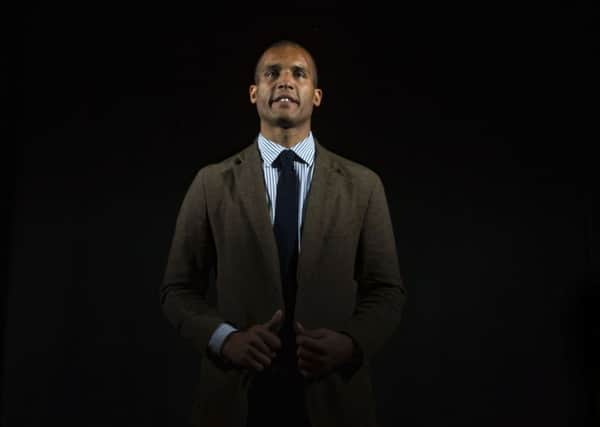Clarke Carlisle speaks candidly about his road to recovery


That aside, it’s hard to believe this is the same man who deliberately stepped in front of a lorry on the A64 near York two years ago this Christmas.
He himself has admitted it’s “amazing, bordering on miraculous” that he’s alive.
Advertisement
Hide AdAdvertisement
Hide AdBut if the outward evidence of his suicide attempt is tough to spot, the bigger question is about the mental scars that drove the former Blackpool player to want to end his life.
Ask him about his progress and he is upbeat. “I’m incredibly good,” he says.
“What are we now, some 20 months since coming out of psychiatric hospital and it’s been a heck of a journey. But it’s wonderful. I’m in a really good space.”
He played for Blackpool 93 times between 1997 and 2000, scoring seven goals before a move south to Queens Park Rangers.
Advertisement
Hide AdAdvertisement
Hide AdIt was during his four-year stint at Loftus Road that Carlisle’s alcohol abuse, triggered by his fragile mental health, became too big a problem to ignore.
A turning point came on the day in 2003 when his manager Ian Holloway ordered him off the team bus for still being drunk from the night before. He sought help and successful spells at Leeds, Watford and Burnley followed.
But the true nadir arrived after his retirement from football.
Two days before he hopped over the central reservation on the A64 he had been charged with drink driving.
Advertisement
Hide AdAdvertisement
Hide AdHaving lost his job as a pundit for ITV, he found himself at rock bottom.
Following his suicide attempt, Chris Kilbride, 24, the driver of a van who swerved to avoid Mr Carlisle, himself commited suicide.
It wasn’t the first time Carlisle had tried to commit suicide and, once dubbed the nation’s most intelligent footballer, he knows there’s no quick fix, that his road to recovery will be “eternal”.
“There’s a lot of personal responsibility on maintaining that and as with anything it fluctuates,” he says, choosing his words with the surgeon-like precision you would expect from someone who enjoyed a successful run as a Countdown contestant.
Advertisement
Hide AdAdvertisement
Hide Ad“But I am aware now of my fluctuations and what to do as and when they arrive.”
To that end he has created coping strategies, what he calls his “toolkit”.
“Just like with your physical health when you’re slightly under the weather you might just need a Lemsip or a couple of paracetamol - the mental health equivalent of that is that I might just need a hug or a chat.
“So I have a council of people around me who I love, who I trust, who I’m brutally honest with and vice-versa, and I’ll go to them.
Advertisement
Hide AdAdvertisement
Hide Ad“If it gets to that point where physically you would go to your GP, I go to see either my counsellor or my consultant psych to have a proper chat with them.
“When I used to feel fear, or sadness, or anger, or anxiety, I would drink, or gamble, or immerse myself in a computer game to avoid it,” he says. “Now the first thing I do is I acknowledge it, then I try to identify where it’s come from and do something that will counteract it.”
His strategies include long walks and runs, listening to Classic FM and, he laughs, “having a smoke of my pipe”.
His life has changed over the intervening period too.
Now separated from wife Gemma, he has a new partner, a new home and a new job. Last week he moved house from Cattal, between Harrogate and York, to Preston.
Advertisement
Hide AdAdvertisement
Hide AdAlongside public speaking engagements, he works for the University and College of Football Business at Manchester City’s Etihad stadium, putting together workshops and seminars for business executives.
But his biggest goal is to continue highlighting mental health issues, something that drove him during his tenure as chairman of the Professional Footballers’ Association.
“We’ve now gone beyond the point of trying to raise awareness,” he says.
“The vast majority of society and business acknowledge there is something to be worked on.
Advertisement
Hide AdAdvertisement
Hide Ad“Now it’s about sharing best practice and getting out the ideas that work. It might be easier for larger organisations to do, but there will be something we can put together that everyone can have access to.”
He wants to see mental health first aiders in every workplace – and more action by government.
“It should be mandatory that we teach this in primary schools because 50 per cent of all mental health issues are in situ before the age of 14.
“Our Government, at the last Budget, reduced mental health research funding.
Advertisement
Hide AdAdvertisement
Hide Ad“But it doesn’t mean that we have to conform to what they don’t enable us to do.
“I believe that grand scale change on this issue comes from the individual, and that has a butterfly effect.”
Scourge of social media...
The constant and scrutiny of social media is a concern, says Clarke Carlisle.
“When we went to school, you had beef, a bit of name calling and maybe some physical stuff, but once you went home you left it behind.
Advertisement
Hide AdAdvertisement
Hide Ad“Now the physical side of bullying has almost gone. “The psychological and emotional manipulation is rife and your child can’t get away from it because they go home to what should be their sanctuary, and it’s there via social media.
“Not only is it a different strain... it’s 24/7.”